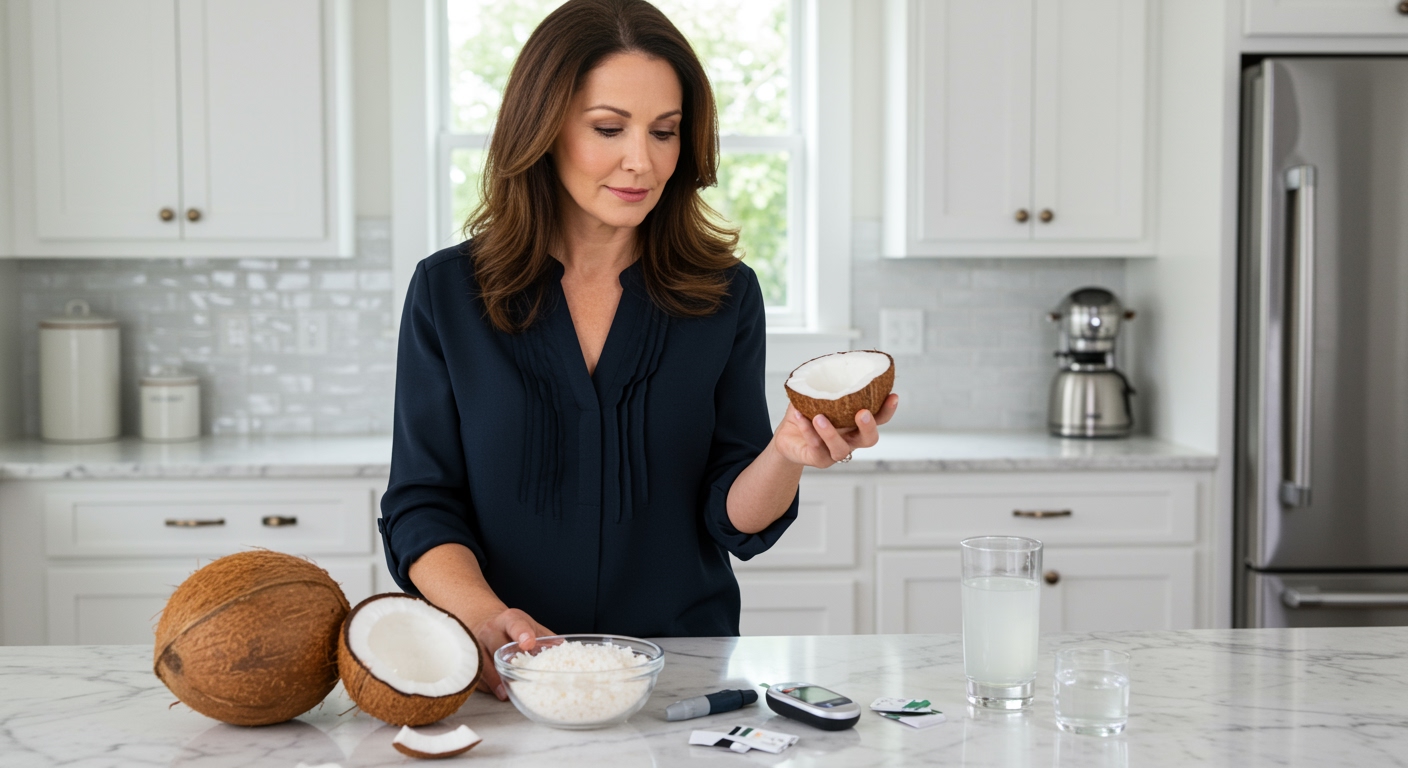✪ Key Takeaway: Raw coconut is generally safe for diabetes due to its low glycemic index and high fiber content that helps stabilize blood sugar.
Introduction
You reach for that fresh coconut at the grocery store and wonder if it will spike your blood sugar.
This question haunts many people with diabetes who want to enjoy natural foods without compromising their health.
Hi, I am Abdur, your nutrition coach and today I am going to explain how raw coconut affects your blood sugar and whether it deserves a place in your diabetes-friendly diet.
What Makes Raw Coconut Different From Other Fruits?
Raw coconut stands apart from typical fruits because of its unique macronutrient profile.
Most fruits contain high amounts of simple sugars that can quickly raise blood glucose levels.
Raw coconut contains only about 6 grams of sugar per 100 grams compared to 16 grams in apples or 12 grams in oranges.
The fiber content in raw coconut reaches 9 grams per 100 grams, which is significantly higher than most fruits.
This fiber acts like a natural brake system that slows down sugar absorption in your digestive tract.
Raw coconut also provides healthy fats that further delay glucose absorption and help maintain steady blood sugar levels throughout the day.
✪ Fact: Raw coconut has a glycemic index of only 35, making it a low-glycemic food choice for diabetics.
How Does Raw Coconut Affect Your Blood Sugar?
The glycemic response to raw coconut remains remarkably gentle compared to processed foods.
When you eat raw coconut, the combination of fiber, fat, and protein creates a slow-release effect for any natural sugars present.
Your body processes the medium-chain triglycerides in coconut differently than other fats.
These special fats go directly to your liver where they get converted into energy rather than being stored as body fat.
The satiety factor of raw coconut helps prevent overeating, which is crucial for blood sugar management.
Research shows that the fiber in coconut can actually improve insulin sensitivity over time when consumed as part of a balanced diet.
✪ Pro Tip: Eat raw coconut with protein-rich foods to further minimize any blood sugar impact.
What About Portion Sizes For Diabetics?
Even healthy foods require portion control when you have diabetes.
A reasonable serving of raw coconut equals about 1 ounce or 28 grams, which provides roughly 100 calories.
This serving size contains approximately 2 grams of natural sugars and 2.5 grams of fiber.
The calorie density of coconut means that larger portions can contribute to weight gain, which negatively affects blood sugar control.
Start with smaller amounts and monitor your individual glucose response using a blood sugar meter.
Some people with diabetes find they can enjoy up to 2 ounces of raw coconut without significant blood sugar spikes.
✪ Note: Individual responses vary, so always test your blood sugar 2 hours after eating coconut to understand your personal tolerance.
Are There Additional Benefits For Diabetics?
Raw coconut offers several metabolic advantages beyond blood sugar control.
The potassium content helps regulate blood pressure, which is often elevated in people with diabetes.
Coconut provides manganese, a mineral that supports proper glucose metabolism and insulin function.
The antioxidant compounds in fresh coconut help reduce inflammation, which plays a role in insulin resistance.
Regular consumption of coconut may support heart health by improving cholesterol profiles when part of a balanced diet.
The natural electrolytes in coconut can help maintain proper hydration, which is important for optimal blood sugar control.
✪ Fact: Studies suggest that coconut consumption may help reduce waist circumference and improve metabolic markers in people with diabetes.
The Bottom Line
Raw coconut can be a safe and nutritious addition to a diabetes-friendly diet when consumed in appropriate portions.
Smart food choices are not about restriction but about understanding how different foods affect your unique body.
I would love to hear about your experience with coconut and blood sugar management, so please share your thoughts or questions in the comments below.
References
At NutritionCrown, we use quality and credible sources to ensure our content is accurate and trustworthy. Below are the sources referenced in creating this article:
- WebMD: Coconut Carbs Diabetes
- DiabeSmart: What is the Glycemic Index of Coconut
- PMC: Coconut and Metabolic Health Research
- Signos: Coconut Glycemic Index





